There’s no denying the unfortunate truth that film music, along with many parts of the film industry, is a male-dominated field. I won’t get into why, as there are many very complex reasons. Instead, I would like to share with you the stories of composers who have done their best to slowly diversify the field. Here is a list of nine female film composers everyone should know.
1. Delia Derbyshire (1937-2001)
Delia Derbyshire was born in 1937 in the English city of Coventry. On this side of the pond, her name is likely unfamiliar to you—unless you are a Doctor Who fan. She was primarily an electronic composer and got her start working as a trainee assistant studio manager with the BBC in 1960. She primarily worked on their segment Record Review, where she reviewed recordings of classical music. Two years later, she was reassigned to the BBC Radiophonic Workshop, a position which was considered by most to be undesirable, which Derbyshire actually requested. It was in the Workshop where her creativity began to shine. Here she helped to create music and sound for almost 200 radio and television programs.
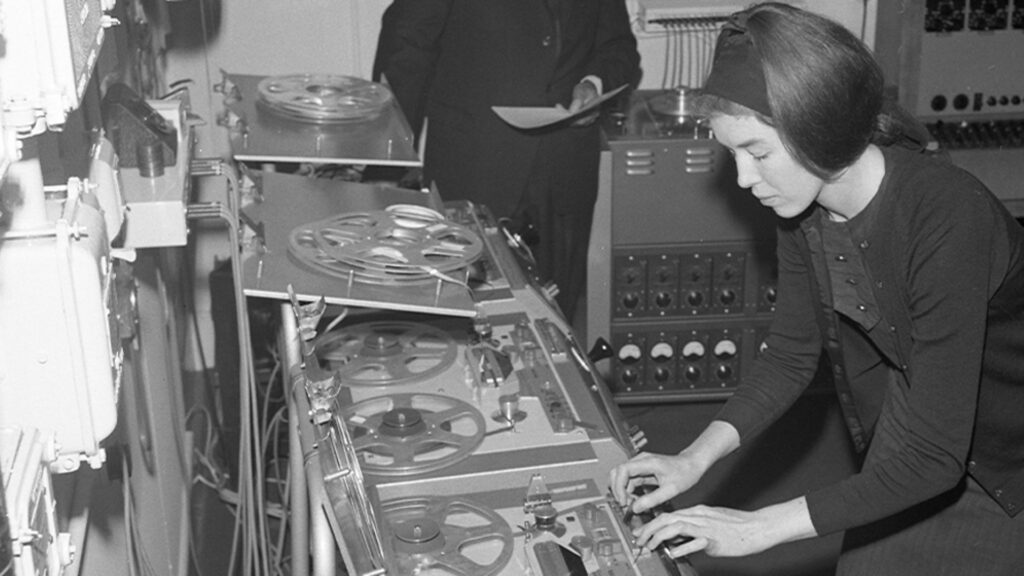
It was also here, in 1963, where she created the now iconic electronic realization of Ron Grainer’s theme for the new BBC television show, Doctor Who. It was considered incredibly innovative for the time and was one of the first completely electronic themes for a TV show. Unfortunately, the BBC ignored Ron Grainer’s efforts to credit Derbyshire as a co-composer of the theme. It wasn’t until the Doctor Who 50th Anniversary Special in 2013—twelve years after Derbyshire’s death—that she received credit for the theme. Even still, many of her other compositions from her time at the Radiophonic Workshop remain uncredited. Nevertheless, there have been other attempts to honor her. In 2016, her hometown of Coventry renamed one of its streets “Derbyshire Way” in her honor, and a plaque now hangs outside her former home there. In 2017, she was also awarded a posthumous honorary doctorate from Coventry University for her contributions to electronic music.
2. Shirley Walker (1945-2006)
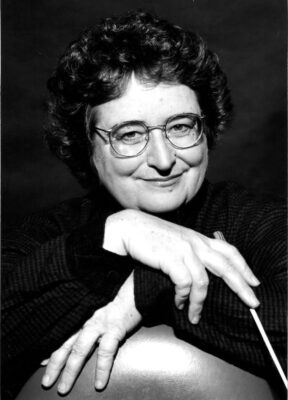
Shirley Walker was an American composer and conductor, born in Napa, California in 1945. She composed for film and television at a time when very few women were actively working in Hollywood. Despite, or maybe because of this, she is considered a pioneer for women in Hollywood, and was one of the first to receive a solo composer credit for a major Hollywood film. She was also known for orchestrating and conducting her own scores. In fact, she was just as active as a conductor as she was as a composer. She collaborated with many different composers, but her most notable partnership was with award-winning composer Danny Elfman. He often turned to her to conduct his scores, including the one he wrote for the 1989 Batman film.
Afterwards, she went on to work with Warner Brothers on many of their DC Animated projects. She wrote music for Batman: The Animated Series (1992-1995), Superman: The Animated Series (1996-2000), The Flash (1990-1991), and Batman Beyond (1999-2001), the last of which earned her a Daytime Emmy Award. She also wrote music for popular TV series The Love Bug (1997), and Spawn: The Animated Series (1997), as well as the full-length animated film, Batman: Mask of the Phantasm (1993). While much of her career was spent working in television, she did also write for film. Some of her more notable scores include Willard (2003) and the first three films in the Final Destination franchise (2000-2006). In 2014, eight years after her death, the first ASCAP Shirley Walker Award was conferred for contributions to the diversity of film and television music.
3. Angela Morley (1924-2009)
Angela Morley was born in Leeds Yorkshire, in 1924 under the name Walter Stott. She was musically inclined from an early age, learning a variety of instruments before even reaching adolescence. She was mostly self-taught, and received little formal training, but was successful early in her career at performing and writing arrangements. Like the previous two composers, she struggled to earn recognition, especially after she transitioned in 1972 and began to live openly as a trans woman. Her works in film include The Heart of Man (1959), The Lady in the Square (1959), The Looking Glass War (1970), The Little Prince (1974), The Slipper and the Rose (1976), and Watership Down (1978).
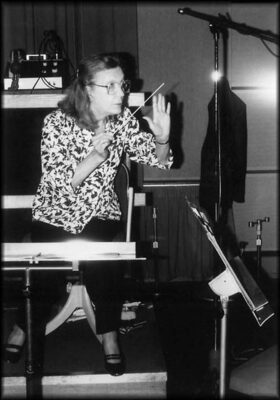
The Little Prince earned her an Oscar nomination, making her the first openly trans woman to receive one. She also earned an Oscar nomination for her work on The Slipper and the Rose which was a collaboration with the Sherman Brothers. She collaborated with many other big names during her career, including John Williams, cellist Yo-Yo Ma, pianist André Previn, composers Lionel Newman and Miklós Rózsa, and violinist Itzhak Perlman. Not only did she compose, but she worked as a conductor and arranger as well. She also received three Primetime Emmy Awards between 1985 and 1990 for Outstanding Music Direction.
4. Wendy Carlos (b. 1939)
Wendy Carlos is best-known for her innovations in electronic music, which played a huge role in her film scores. Born Walter Carlos in 1936, she quickly showed an inclination towards music. She went on to study both physics and music at Brown University, before earning a master’s degree in music composition from Columbia University. She soon began experimenting in electronic music, and later assisted Robert Moog in his development of the revolutionary Moog Synthesizer. Her rise to fame in electronic music came with the release of her album Switched-On Bach (1968), which was a compilation of Bach pieces performed on a Moog Synthesizer. It surprised everyone as a massive success, hitting No. 10 on the US Billboard 200 chart. It went on to sell over one million copies—only the second classical album to do so—and was certified Gold in 1969 and Platinum in 1986. The album also won three Grammys in 1969 for Album of the Year, Classical; Best Classical Performance-Instrumental Soloist or Soloists (With or Without Orchestra); and Best Engineered Recording, Classical.
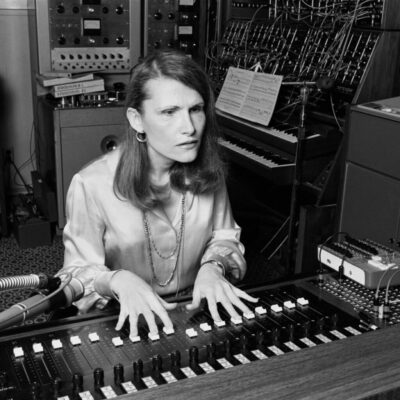
It was around this time that Carlos began a gradual transition, which was disrupted by the unexpected success of Switched-On Bach. She faced many struggles within the music and later film industry as she fought to live her life the way she wanted, and eventually, publicly acknowledged her transition. She later became an advocate for other trans people and continues to raise public awareness for trans issues.
Carlos’s success with Switched-On Bach also drew the attention of the film industry. Many directors were intrigued by the other-worldly sounds of the Moog, including Stanley Kubrick, who offered Carlos her first film score A Clockwork Orange (1971). Carlos later collaborated with him again for his film adaptation of Stephen King’s book The Shining (1980). While both of these scores were important in Carlos’s advancement of electronic music, she is best known for her score of Disney’s sci-fi film, Tron (1982). For this film, Carlos combined orchestral elements to her usual electronic style, performed by the London Philharmonic. The combination was revolutionary and created a sound that—at the time—was completely unique to the film. While none of her film scores earned her any accolades, her innovations in electronic music left an unquestionable mark on film music.
For more on Wendy Carlos’s score for Tron, check out David W. Collins’s in-depth analysis on his podcast, The Soundtrack Show:
5. Anne Dudley (b. 1956)
English composer, keyboardist, and conductor Anne Dudley began her career as a session musician after earning her master’s degree from King’s College London in 1978. She has worked in both classical and pop worlds with her contributions to the synth-pop band The Art of Noise, as well as film music. She has written music for over forty films, including The Crying Game (1992), Elle (2016), and The Full Monty (1997), for which she won the Academy Award for Best Original Musical or Comedy Score. Dudley was only the second woman to ever win the Oscar, behind Rachel Portman in 1996. She also won the Grammy for Best Rock Instrumental Performance with The Art of Noise in 1986. Like many other female film composers before her, she wore many hats, performing, composing, arranging, conducting, and writing songs.
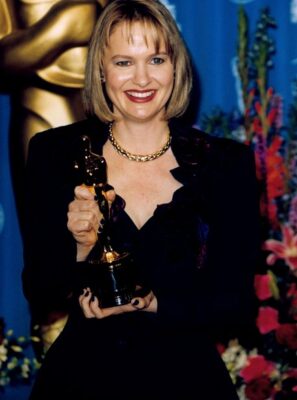
6. Rachel Portman (b. 1960)
English composer Rachel Portman is likely one of the biggest female names in film music. She has scored over 100 films and was even awarded an OBE (Officer of the Order of the British Empire) in 2010. She got her start writing music for BBC and Channel 4 productions like the film Four Days in July (1984) and the series Oranges are Not the Only Fruit (1990) and The Storyteller (1987). Some of her other films include The Joy Luck Club (1993), Benny and Joon (1993), The Cider House Rules (1999), Chocolat (2000), (both of which earned her Oscar nominations), The Manchurian Candidate (2004), Belle (2013), Bessie (2015), and Emma (1996), for which she won the Oscar for Best Musical or Comedy Score.
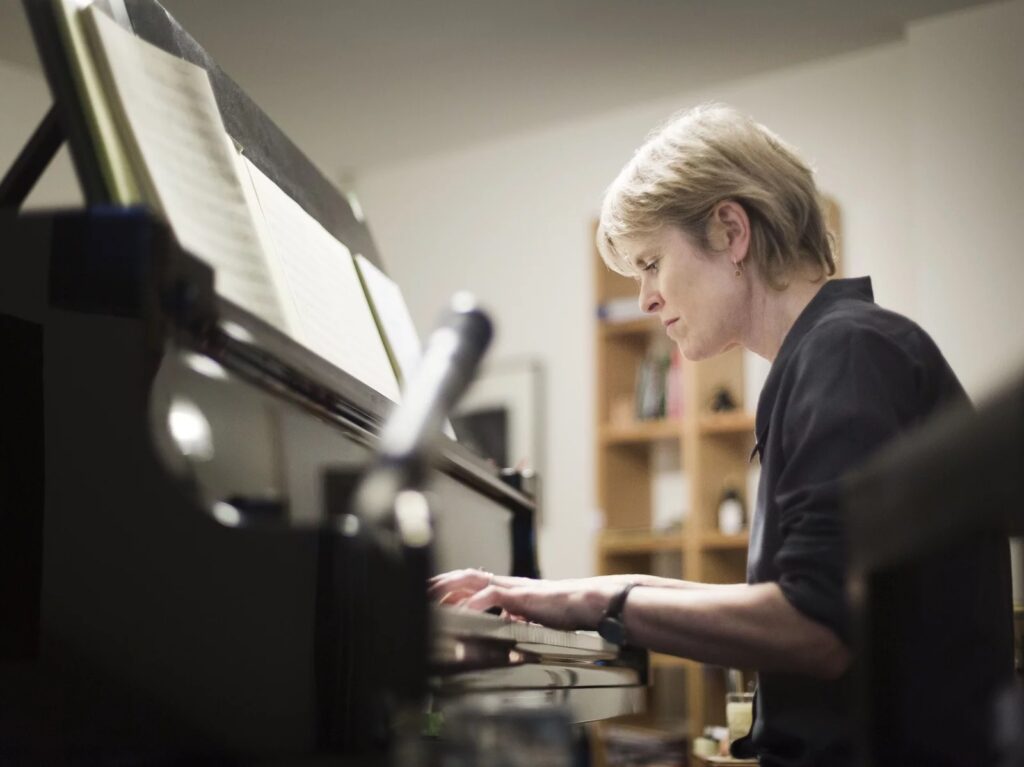
Portman was the first woman to win the Oscar. She also earned the British Film Institute Anthony Asquith Award for her music for The Storyteller (1987) and the Primetime Emmy for Outstanding Music Composition for a Miniseries, Movie, or a Special, for Bessie (2015). And at the BMI Film and TV Awards in 2010, she was the first woman to be awarded the Richard Kirk Award for her contributions to film and TV music.
7. Lesley Barber (b. 1962)
Lesley Barber is a Canadian conductor, producer, and composer who has written music for film and theater. She also plays multiple instruments, including piano, and has written for orchestra and chamber ensembles. She earned her master’s degree in music composition from the University of Toronto, where she studied with composers Gustav Ciamaga and Lothar Klein. Some of her best-known film scores include Manchester by the Sea (2016), Late Night (2019), You Can Count on Me (2000), Mansfield Park (1999), Irreplaceable You (2018), Hysterical Blindness (2002), and When Night Is Falling (1995). Barber also wrote the music for the popular animated children’s series, Little Bear, which initially ran from 1995 to 2001, and received a direct-to-video movie The Little Bear Movie (2001), released at the end of the series.
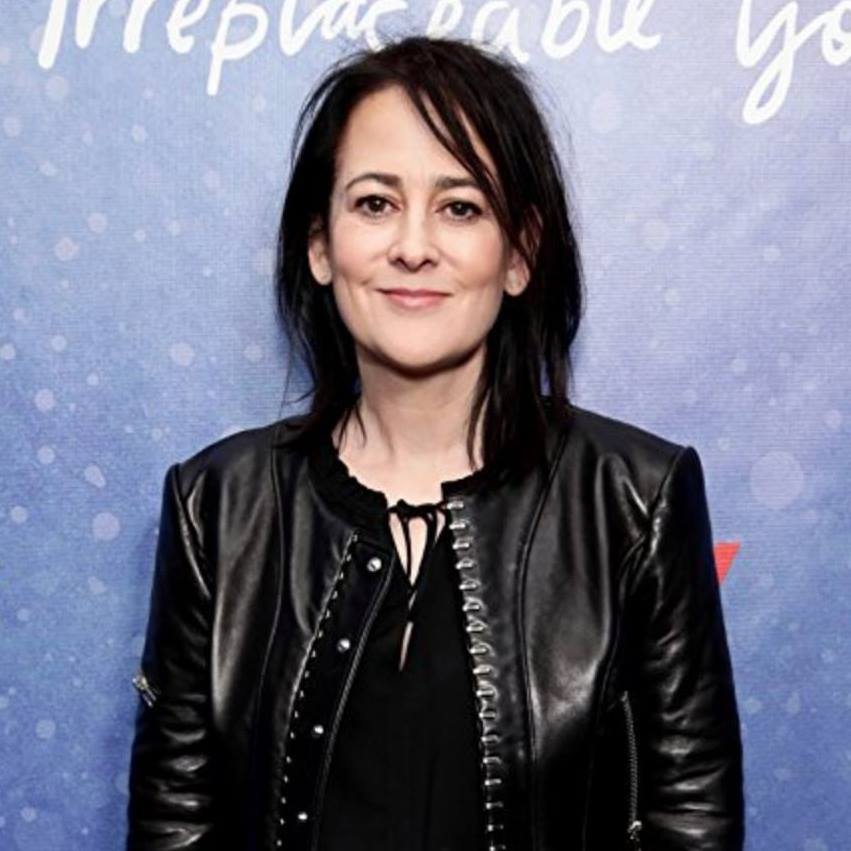
8. Pinar Toprak (b. 1980)
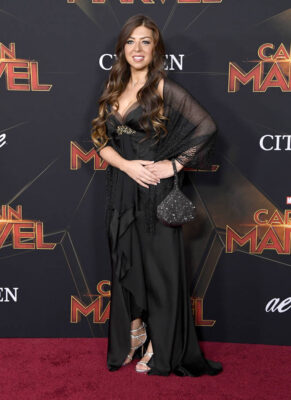
Pinar Toprak is a Turkish-American composer who, after watching the 1978 Superman film starring Christopher Reeves and featuring John Williams’s iconic score, developed a love for music and superheroes. While growing up in Istanbul, her parents encouraged her love of music and she began learning from an early age. After graduating from high school at 16, she moved to the United States where she studied at Berklee College of Music. At 19, film scoring degree in hand, she moved to LA where she earned her master’s degree in classical music composition from CSU Northridge. Her big break came in 2006 with her music for the video game Ninety-Nine Nights (2006).
In 2009, she received the International Music Critics Association Award for Best Comedy Score for her work on the film The Lightkeepers (2009). This eventually led to a chance to work with Danny Elfman on Zack Snyder’s Justice League (2017), her first major superhero project. She has since gone on to do multiple superhero projects for both Marvel and DC, including TV series Krypton (2018-2019) and Stargirl (2020 – ). But her best-known film is Marvel Studios’s Captain Marvel (2019), which made her the first female composer to score a Marvel film. Her primetime Emmy nomination for the series McMillions (2020) also made her the first Turkish composer to receive an Emmy nomination.
9. Hildur Guðnadóttir (b. 1982)
If you consider yourself a fan of film music and haven’t heard of the last composer on this list, then you haven’t been paying attention. Icelandic composer and cellist Hildur Guðnadóttir was engulfed by music at a young age. With an opera singer for a mother and a composer/clarinetist/ music teacher for a father, one could say it was all but inevitable. She attended the Reykjavik Music Academy before studying composition and new media at Iceland Academy of the Arts and Berlin University of the Arts. Before her foray into film music, she released four solo albums with a variety of collaborators.
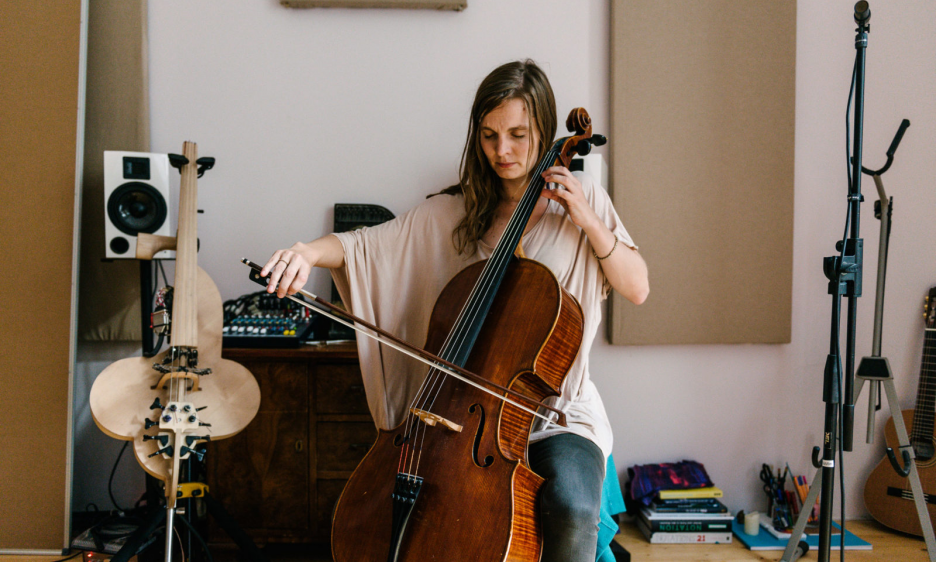
Some of her more notable film and TV projects include Journey’s End (2017), Mary Magdalene (2018), Sicario: Day of the Soldado (2018), Tár (2022) and Women Talking (2022). She also won a Primetime Emmy for Outstanding Music Composition for a Limited Series, Movie, or Special, for the limited series Chernobyl (2019) as well as a Grammy and a BAFTA. However, she is best known for her score for the 2019 film Joker, starring Joaquin Phoenix. She won multiple awards for the score, including a BAFTA, Golden Globe, and the Academy Award for Best Original Score. She is only the third woman to win the Oscar, the first since the separate categories for comedy and dramatic scores were consolidated, and the first female composer to win an Oscar, BAFTA and Golden Globe. As far as Hildur is concerned, I think it’s safe to say we can expect many more fantastic film scores to come.
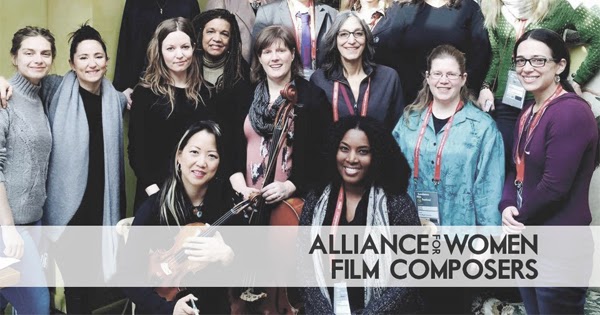
For more on female film composers, check out the Alliance for Women Film Composers and their directory of women currently working in the field.
Kathryn Edom is a composer and aspiring music librarian in her second year of IU’s MLS (Library Sciences) program. She previously attended Sacramento State University and University of Oregon where she received her BM and MM (respectively) in music composition. On top of her courses, she currently juggles three different library jobs, and in her limited spare time, enjoys reading, writing music, playing Breath of the Wild, and watching Oregon football.
Leave a Reply